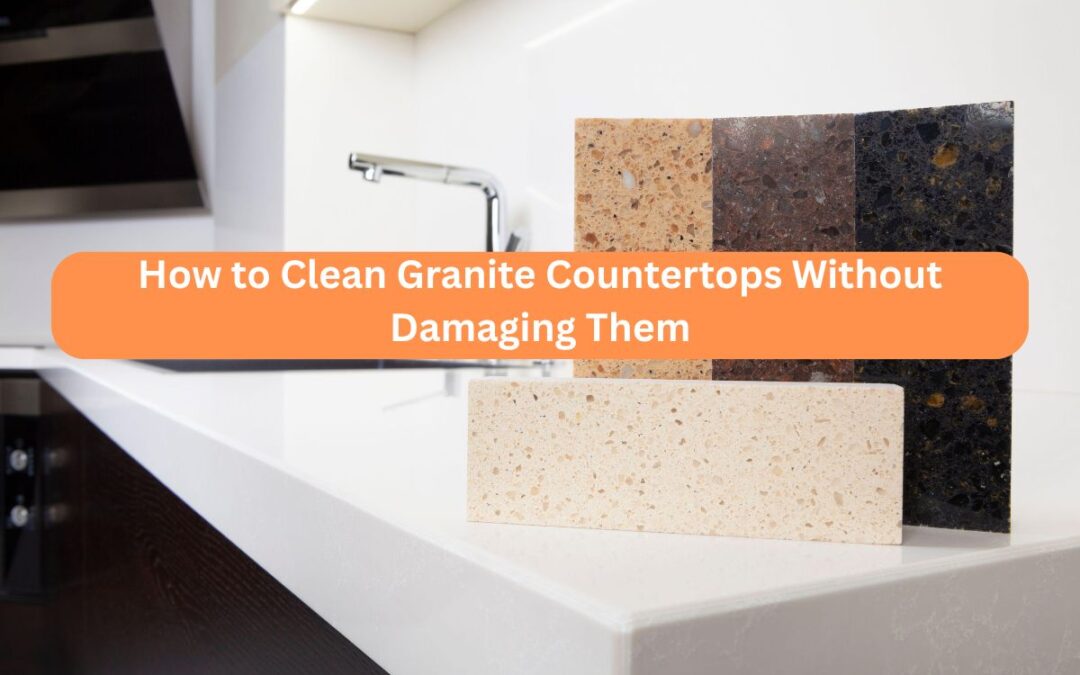Granite countertops can make your kitchen feel elegant and timeless. But here’s the problem — they are tough, yet surprisingly sensitive. One wrong cleaning product can dull the shine or strip away the protective sealant. Imagine investing thousands in a beautiful granite slab, only to ruin it with a quick wipe of vinegar. Ouch.
The good news? Keeping granite spotless without damaging it is simple once you know the right techniques. This guide covers safe daily cleaning, how to remove stubborn stains, when to reseal, and mistakes to avoid — all backed by expert advice and real-life care tips.
Key Takeaways
- Clean granite daily with mild dish soap and warm water.
- Avoid acidic cleaners like vinegar, lemon juice, and bleach.
- Use baking soda poultice for tough stains such as wine or coffee.
- Dry thoroughly after cleaning to prevent water spots.
- Reseal granite every 12–18 months to protect against stains.
Why Do Granite Countertops Need Special Care?
Granite is a natural stone. That means every slab is unique, but also porous. Liquids can seep in if the protective sealant wears down. According to the Marble Institute of America, 90% of granite countertops require resealing every one to three years depending on use. Without this barrier, oil, wine, and coffee can leave permanent marks.
Unlike quartz or laminate, granite is also sensitive to acids. Everyday items like orange juice or vinegar can etch the glossy surface within minutes. This is why granite needs a gentler, more tailored cleaning routine.
What Is the Best Daily Cleaning Routine for Granite?
Daily cleaning doesn’t have to be complicated. Here’s the safest method:
- Mix a few drops of mild dish soap with warm water.
- Dampen a microfiber cloth (avoid rough sponges).
- Wipe the surface in small circles to lift crumbs and grease.
- Rinse with clean water to remove soap residue.
- Dry thoroughly with a soft towel to prevent streaks.
Why it works: Dish soap is pH-neutral. It cleans without breaking down the sealant. Microfiber cloths prevent scratches that can trap dirt.
💡 Pro tip: Keep a spray bottle of this solution handy so you can wipe up spills immediately.
How Do You Deep Clean Granite Weekly?
A deeper clean once a week keeps granite looking fresh.
- Spray a granite-safe cleaner evenly across the countertop.
- Let it sit for 30 seconds.
- Wipe with a microfiber cloth.
- Buff with a dry cloth for a polished finish.
If you prefer DIY, try this safe mix:
- 50% isopropyl alcohol
- 50% water
- A few drops of dish soap
This solution disinfects while preserving granite’s protective layer.
How Do You Remove Stubborn Stains from Granite?
Spills happen — but don’t panic. With the right method, most stains come out safely.
| Stain Type | Safe Cleaning Method | Avoid |
| Grease | Baking soda + water paste. Cover with plastic wrap for 10 minutes. | Harsh degreasers |
| Coffee/Wine | Baking soda + hydrogen peroxide poultice. Leave overnight. | Vinegar or lemon juice |
| Water Spots | 50/50 isopropyl alcohol + water. Wipe with microfiber cloth. | Abrasive scrubs |
| Food Residue | Mild dish soap + warm water. | Bleach-based cleaners |
Note: For stubborn stains that don’t improve after two attempts, contact a stone-care professional. Over-scrubbing can do more harm than good.
How Often Should Granite Countertops Be Sealed?
Granite should be resealed every 12–18 months. Some busy kitchens may need it yearly.
How to Test If Granite Needs Sealing
- Drop a few teaspoons of water on the surface.
- If the water beads up → Sealant is intact.
- If it darkens within minutes → Time to reseal.
How to Seal Granite
- Clean the countertop thoroughly.
- Apply granite sealer evenly with a soft cloth.
- Let it sit 15–20 minutes.
- Wipe away excess.
- Allow 24–48 hours to cure.
According to a survey by Stone World Magazine, 70% of homeowners who resealed granite annually reported fewer stains and longer-lasting shine.
What Cleaning Mistakes Should You Avoid with Granite?
Even with good intentions, many homeowners damage granite by accident. Avoid these common errors:
- Using acidic cleaners. Vinegar, lemon juice, and bleach strip away sealant.
- Scrubbing with abrasive pads. Steel wool scratches granite.
- Letting spills sit. Oils and dark liquids can stain within minutes.
- Skipping the drying step. Standing water causes cloudy spots.
- Forgetting resealing. An unsealed countertop is vulnerable to everything from wine to tomato sauce.
What Are the Best Granite-Safe Cleaners?
While soap and water work for everyday cleaning, here are some popular safe cleaners:
- Weiman Granite Cleaner & Polish – adds shine while cleaning.
- Granite Gold Daily Cleaner – pH-balanced and ammonia-free.
- DIY Spray – 50% water + 50% isopropyl alcohol + dish soap.
Always check labels for “safe for stone” before using.
FAQs
Can I use Clorox wipes on granite?
No. Most contain bleach or disinfectants that harm granite’s sealant. Use granite-safe wipes instead.
Is baking soda safe for granite?
Yes, but only as a paste. Avoid scrubbing dry baking soda directly on the stone.
What is the best homemade cleaner for granite?
A mix of isopropyl alcohol, water, and a few drops of dish soap. This kills bacteria and leaves the surface streak-free.
How do I restore shine to dull granite?
Buff with a microfiber cloth after cleaning. For extra gloss, use a granite polish once or twice a month.
Can granite be permanently damaged?
Yes. Harsh chemicals and neglecting resealing can cause etching and stains that are difficult to fix without professional help.
Quick Granite Care Checklist
- Wipe daily with dish soap and water.
- Dry completely to prevent water spots.
- Blot spills immediately — don’t wipe.
- Deep clean weekly with a granite-safe cleaner.
- Test sealing annually and reseal every 12–18 months.
- Use coasters and trivets to protect against scratches and heat.
Final Thoughts
Granite countertops are a major investment in your kitchen’s look and value. The right care routine keeps them stunning for years. Clean daily with mild soap, tackle stains with safe poultices, and reapply the sealant regularly to maintain a protective barrier. Just as important, avoid common mistakes like vinegar or harsh pads.
With consistent care, granite can last for decades without losing its shine. The secret isn’t expensive products or complicated steps — it’s about using safe, simple methods that respect the natural stone.

As the chief content writer, Hassan Al Sarker works as a professional kitchen-based content creator at Kitchen Liker.
In addition to reviewing the content published on Kitchen Liker, he ensures that it is accurate, relevant, and helpful. As a result, all the reviews and information published at Kitchen Liker are neutral and userfriendly.
Hassan Al Sarker has a bachelor’s degree in Hotel and Tourism Management From the Newyork University. Before joining Kitchen Liker, he was a contributor at Kitchen Club, United States.

